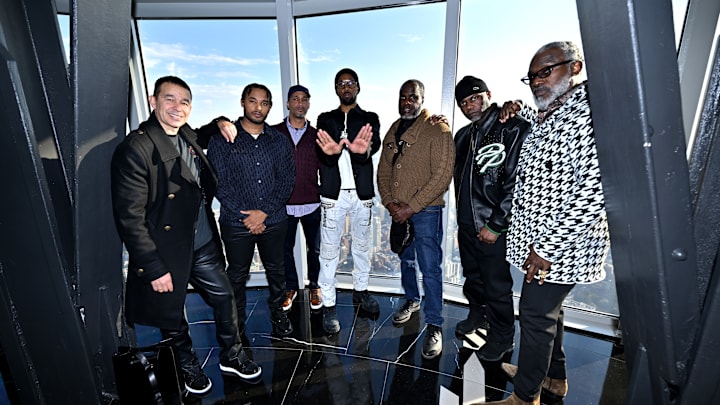Hip-hop, a cultural phenomenon that emerged from the streets of New York City, has given birth to countless artists, but some groups stand out as true pioneers. These legendary collectives have shaped the genre, leaving an indelible mark on the music scene. Let’s dive into the world of hip-hop and explore four iconic groups that continue to influence artists and fans alike.
1. Run-D.M.C.
"Origin: New York City
Members: Joseph Simmons, Darryl McDaniels and Jason Mizell"
The group was formed in 1981 by Joseph Simmons (Run), Darryl McDaniels (D.M.C.), and Jason Mizell (Jam Master Jay). They are widely regarded as the most influential act in the history of hip hop, as they brought the genre to mainstream popularity and crossover success. They were the first hip-hop group to have a gold album, a platinum album, a multi-platinum album, a Grammy nomination, a Rolling Stone cover, and a video on MTV.
They also collaborated with rock legend Aerosmith on the hit song "Walk This Way", which broke down the barriers between rap and rock. Run-D.M.C. was known for their distinctive style of wearing Adidas sneakers, leather jackets, and fedora hats, as well as their powerful lyrics that addressed social issues and celebrated their culture.
2. Beastie Boys
Origin: New York City
Members: Mich Diamondael, Adam Yauch and Adam Horovitz
Beastie Boys was formed in 1979 by Mich Diamondael (Mike D), Adam Yauch (MCA), and Adam Horovitz (Ad-Rock). They started as a punk rock band, but later switched to hip hop and became one of the most successful and influential groups of all time. They were the first hip hop group to have a number one album on the Billboard 200 chart, with their debut album Licensed to Ill in 1986.
They were also known for their eclectic and innovative musical style, which incorporated elements of rock, funk, jazz, reggae, and more. They were also known for their humorous and rebellious lyrics, which often parodied and criticized mainstream culture and politics.
3. Wu-Tang Clan
Origin: Staten Island, New York
Members: RZA, GZA, Method Man, Raekwon, Ghostface Killah, Inspectah Deck, U-God, Masta Killa, and Ol’ Dirty Bastard (RIP)
No discussion of hip-hop groups is complete without mentioning the Wu-Tang Clan. Formed in the early '90s, this influential collective revolutionized the game. With their kung-fu-inspired aesthetic, intricate lyricism, and distinct personalities, they created a movement. Their debut album, “Enter the Wu-Tang (36 Chambers),” remains a masterpiece. Hits like “C.R.E.A.M.” and “Protect Ya Neck” solidified their legendary status.
4. Public Enemy
Origin: New York City
Members: Carlton Ridenhour, William Drayton, Norman Rogers and Richard Griffin
Public Enemy was formed in 1985 by Carlton Ridenhour (Chuck D), William Drayton (Flavor Flav), Norman Rogers (Terminator X), and Richard Griffin (Professor Griff). They are widely regarded as one of the most influential and controversial groups in the history of hip hop, as they brought political and social consciousness to the genre.
They were known for their hard-hitting and provocative lyrics, which addressed topics such as racism, oppression, media bias, and government corruption. They were also known for their powerful and innovative production, which incorporated samples, sirens, noise, and turntablism. They were also known for their militant and radical image, which included wearing military uniforms, clocks, and logos of the Black Panther Party and the Nation of Islam.
5. A Tribe Called Quest
Origin: New York City
Members: Kamaal Fareed, Malik Taylor, Ali Shaheed Muhammad, and Jarobi White
A Tribe Called Quest was formed in 1985 by Kamaal Fareed (Q-Tip), Malik Taylor (Phife Dawg), Ali Shaheed Muhammad, and Jarobi White. They are widely regarded as one of the most influential and innovative groups in the history of hip hop, as they pioneered the subgenre of alternative hip hop. They were known for their eclectic and creative musical style, which incorporated elements of jazz, soul, funk, and more.
They were also known for their positive and intelligent lyrics, which addressed topics such as spirituality, love, social issues, and culture. They were also known for their smooth and harmonious flow, which contrasted with the aggressive and hardcore style of their contemporaries. They were nominated for the Rock and Roll Hall of Fame in 2017⁴.
6. M.O.P. (Mash Out Posse)
Origin: Brooklyn, New York
Members: Lil Fame and Billy Danze
M.O.P., also known as Mash Out Posse, burst onto the scene in the early '90s with their gritty and unapologetic style. Their aggressive delivery and raw wordplay resonated with fans who craved authenticity. The duo’s anthem “Ante Up” remains a classic, featuring explosive production and an unforgettable remix with Busta Rhymes, Remy Ma, and Teflon. M.O.P.'s longevity—over 25 years—speaks to their enduring impact on East Coast hip-hop.
7. Black Star
Origin: Brooklyn, New York
Members: Mos Def (now known as Yasiin Bey) and Talib Kweli
Black Star, a collaboration between Mos Def and Talib Kweli, represents conscious and artistic hip-hop. Rejecting violence and materialism, they stood as inheritors of the grand tradition set by legends like Rakim and KRS-One. Their debut album, “Mos Def & Talib Kweli Are Black Star,” delivered thought-provoking lyrics and impactful storytelling. Songs like “Definition” and “Respiration” showcased their lyrical prowess and commitment to social commentary.
8. Run the Jewels
Origin: United States
Members: Killer Mike and El-P
Run the Jewels, a modern supergroup formed by Killer Mike and El-P, defies conventions. Their chemistry is electric, blending raw energy, social critique, and innovative production. Their self-titled debut album in 2013 introduced a new era of hip-hop. Tracks like “Close Your Eyes (And Count to F)” and “Legend Has It” showcase their ability to tackle complex issues while keeping the beats banging. Run the Jewels continues to push boundaries and challenge the status quo.
In summary, these hip-hop groups have entertained us and challenged our perspectives. Their impact extends beyond music—they’ve influenced fashion, language, and culture. As we celebrate their contributions, let’s recognize the power of unity and creativity within hip-hop.
